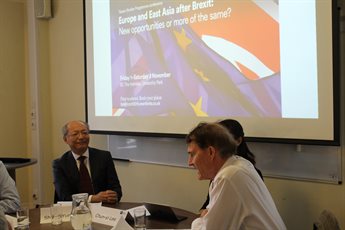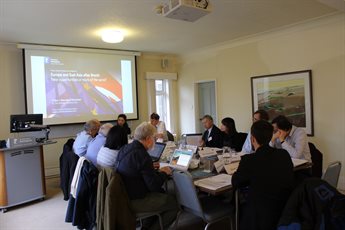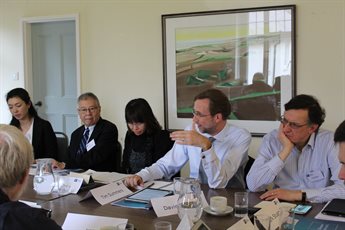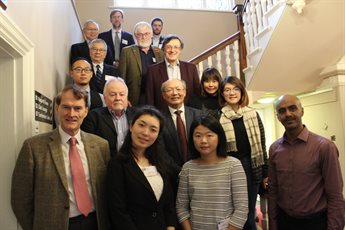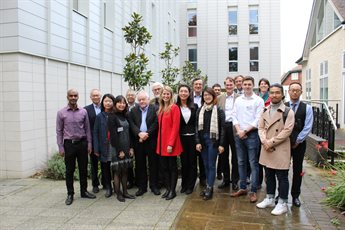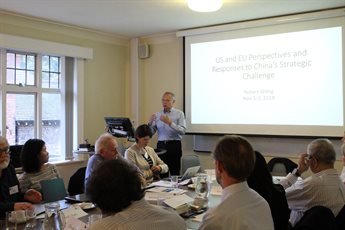Europe and East Asia after Brexit: New opportunities or more of the same?
The EU’s interest in and engagement with North East Asia has grown massively over the last three decades, especially since the turn of the century. Although trading links between Europe and Asia go back many centuries, with the exception of the UK and to a lesser extent France, these links largely disappeared after the end of WW2. While the resurgence has been driven first and foremost by trade, especially since China joined the WTO in 2001, the UK’s residual links have enabled it to exercise significant, even disproportionate, influence on the shaping and implementation of the EU’s Asian policy, for example through the introduction of the EU’s Guidelines on Foreign and Security Policy in East Asia in 2006.
The UK’s departure from the EU may well affect the future direction of the EU’s policy to the region and the purpose of this conference is to examine what relations with the region will look like for both the EU and UK in the post-Brexit world. For example, will the EU, shorn of the UK, be more susceptible to US thinking and influence towards the region, as China initially thought in the aftermath of the UK’s referendum? Or conversely, will the EU gravitate more to the Chinese sphere of influence and if so, what would be the consequences for its relations with China’s neighbours and the neighbours themselves? And what of the UK’s role? Outside the EU will it have a free rein to pursue a more independent foreign policy as Brexiteers argue and if so, what will this mean for its relations with the region? Or will it find itself constrained by a lack of resources to pursue such a policy?
Several attempts have already been made to answer these questions from a mainly trade perspective. In this conference we aim to examine them more from a diplomatic and security perspective, while not ignoring economic aspects but also including wider issues such as the possible impact on educational and research links. In our conference, we also include voices from the region about Brexit, for its impact is not only on EU/UK but affects the whole globe. Our main concern in this context is its impact on the region of North East Asia. While the future of the UK’s relationship with the EU remains far from clear, sufficient time has elapsed since the referendum for countries in the region to adjust their policy perspectives to take account of the UK’s likely departure from the Union, making our questions easier to address.
Friday 1 November
|
10am
|
Registration (with tea/coffee)
|
|
10.15-10.30am
|
Opening remarks by:
- Dr Chun-yi Lee, Director, Taiwan Studies Programme, University of Nottingham
- Dr Michael Reilly, Non-Resident Fellow of Taiwan Studies Programme, University of Nottingham
- Deputy Representative Shyan-Yun Cheng, Taipei Representative Office in the UK
|
|
10.30-11.20am
(20 minutes discussion, 30 minutes discussion)
|
Chair: Michael Reilly, Non-Resident Fellow of Taiwan Studies Programme, University of Nottingham
First session: The USA-East Asia and the contest to shape a reformed world economic order:
What role for Europe and the UK after Brexit?
Speaker: Richard Higgott (Institute for European Studies, Brussels)
|
|
11.20-11.30am
|
Break (with tea/coffee) Group Photograph in Millennium Garden
|
|
11.30am-12.20pm
(20 minutes presentation, 30 minutes discussion)
|
Chair: Robert Wang (former US Deputy Chief of Mission to China)
Second session: EU and North East Asia: Recent historical context
Speaker: Rod Wye (Chatham House)
|
|
12.20-1.30pm
|
Lunch (sandwich lunch)
|
|
1.30-3pm
(20 minutes presentation, 20 minutes discussion)
|
Chair: Robyn Kingler-Vidra (King’s College London)
Presentation one: Building Taiwan-UK security linkages alter Brexit: A bridge too far
Speaker: Andrew Yang (National Sun Yat-sen University, Taiwan)
Presentation two: The Japanese government’s response to Brexit
Speaker: David Warren (Chatham House)
|
|
3-3.20pm
|
Break (with tea/coffee)
|
|
3.20-4.50pm
(20 minutes presentation, 20 minutes discussion)
|
Chair: Katharine Adeney(Director of Asia Research Institute, University of Nottingham)
Presentation one: US and EU perspectives and responses to China’s strategic challenge
Speaker: Robert Wang (former US Deputy Chief of Mission to China)
Presentation two: China’s BRI infrastructure connection and Brexit
Speaker: Tim Summers (The Chinese University of Hong Kong (CUHK) and Chatham House)
|
|
4.50-5pm
|
Break
|
|
5-6pm
|
Chair: Michael Reilly, Non-Resident Fellow of Taiwan Studies Programme, University of Nottingham and
Chun-yi Lee (Taiwan Studies Programme)
Roundtable discussion
|
|
6pm
|
Conclude
|
Saturday 2 November
|
9-11am
(20 minutes presentation, 20 minutes discussion)
|
Chair: Chun-yi Lee (Taiwan Studies Programme)
Presentation one: Taiwan and EU’s connection of innovation?
Speaker: Robyn Kingler-Vidra (King’s College London)
Presentation two: The impact of Brexit on the higher education sector and the connection with East Asia
Speaker: Pei Hsi Lin (SOAS, University of London)
Presentation three: A new World Trade Order? The EU, Brexit and the CPTPP
Speaker: Michael Reilly (Non-Resident Fellow of Taiwan Studies Programme, University of Nottingham)
|
|
11-11.15am
|
Break (with tea/coffee)
|
|
11.15am-12.15pm
|
Chair: Michael Reilly, Non-Resident Fellow of Taiwan Studies Programme, University of Nottingham and
Chun-yi Lee (Taiwan Studies Programme)
Roundtable discussion
|
|
12.15-12.30pm
|
Concluding remarks
|
Conference reflections
Review by Arthur Quayle Taiwan Studies Programme Intern, third year Politics and International Relations
While another Brexit extension meant that the conference was held prior to, as opposed to after Brexit as intended, the content of the conference was still just as relevant. Richard Higgot of the Institute for European Studies in Brussels kicked things off with his presentation on the changing world order of geo-politics. He outlined the decline and ultimate fall of the American-led world order, putting forward possibilities for a new world order, perhaps one in which the EU establishes itself as a major player. This was followed by Rod Wye of Chatham House and his presentation on the recent historical relations between Europe and East Asia. His presentation highlighted the cultural clashes between East and West, recognising that the lure of business in Chinese has seen some in the West disregard the values at the very heart of our society and culture. After this came Andrew Yang of Taiwan’s National Sun Yat-sen University, presenting on the post-Brexit security linkages between the UK and Taiwan. Andrew highlighted the threat of cross-strait conflict, its determining factors and the role of the UK in these post-Brexit.
The next presentation by David Warren of Chatham house shifted the attention to Japan and looked at the Japanese government’s response to Brexit, he himself having served as the British ambassador to Japan. David’s central argument was that that Brexit threatened the UK’s position as a gateway into the EU for Japanese companies. Former US diplomat Robert Wang was next to present and he argued that, much like Richard Higgot, an increasingly isolationist US will mean that in the coming years Europe must take on more of a role in sustaining the liberal international order. Tim Summers, of the Chinese University of Hong Kong and Chatham House, wrapped up the day with his presentation linking China’s Belt and Road Initiative to Brexit. Tim outlined that the benefits to the UK come not only in direct investments but also in the development of 3rd party markets internationally.
Day two began with Robyn Kingler-Vidra of Kings College London’s presentation on the links between the EU and Taiwan in terms of innovation. The presentation focused on the competition in the innovation of key semiconductors, highlighting the disturbance a no-deal Brexit could cause to key areas of UK trade and innovation. Susan Lin of SOAS University of London was the penultimate speaker and she presented on the impact Brexit will have on higher education and the links to East Asia, arguing that ultimately while UK-EU higher education links will undoubtedly be damaged, UK-East Asian links will remain strong. Former British diplomat Michael Reilly would conclude the conference with his presentation on the possibility of a new world order headed by the EU and the CPTPP, stressing the opportunities that East Asia presents for the EU. The conference was incredibly educational, with both the presentations and following discussions proving informative.
Review by Kaled Alsultan, MA International Relations.
One of benefits of being a postgraduate student is that when I attended Brexit conference, I was able to understand the many perspectives about how Brexit may affect relations between the UK and China. This conference gave me the unique opportunity to understand the various possible effects on relations between states post-Brexit, because the participants in the conference are highly respected experts in the study of East Asian politics and have years of experience in this field. Personally, I met with more than one participant in whose area of research I was incredibly interested.
Moreover, I know this conference will support me in my field of study, allowing me to understand more about the discipline of International Relations. I advise and encourage both postgraduate students and undergraduates to attend conferences such as this in the future, as I feel they will take away new knowledge which will help them in future research and study. I am extremely glad I attended this conference as it help me to understand more about the International Political Economy, an area of keen interest to me and one of key importance to the study of IR.
